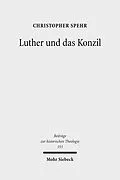Christopher Spehr sheds light on how Luther developed his concept of a council and how he modified this during his entire lifetime. He also provides insight into the entire structure of Luther's theology, which was centered around the theology of the doctrine of justification.
As an institution of the church and a Christian authority, the council became a central and, from the perspective of religious policy, highly controversial topic during the Reformation. The discussions, which were held on theological, church and political levels, were triggered by Martin Luther, whose attitude towards the council had up to now not been studied in detail. Christopher Spehr succeeds in providing a differentiated analysis of Luther's attitude towards the councils in the ancient church and the (late) Middle Ages as well as towards those demands for a council in the decades of the Reformation. The author sheds light on how Luther developed his concept of a council and how he modified this during his entire lifetime and also studies the question of Luther's intentions in occasionally calling for a "free, Christian council." Since the question of a council also affected the problem of church authority at the same time, this study provides insight into the entire structure of Luther's theology, which was centered around the theology of the doctrine of justification.
Autorentext
Geboren 1971; Studium der Ev. Theologie in Bethel, Tübingen, Zürich; 2004 Promotion; 2009 Habilitation; seit 2011 Professor für Kirchengeschichte an der Theologischen Fakultät der Friedrich-Schiller-Universität Jena.
As an institution of the church and a Christian authority, the council became a central and, from the perspective of religious policy, highly controversial topic during the Reformation. The discussions, which were held on theological, church and political levels, were triggered by Martin Luther, whose attitude towards the council had up to now not been studied in detail. Christopher Spehr succeeds in providing a differentiated analysis of Luther's attitude towards the councils in the ancient church and the (late) Middle Ages as well as towards those demands for a council in the decades of the Reformation. The author sheds light on how Luther developed his concept of a council and how he modified this during his entire lifetime and also studies the question of Luther's intentions in occasionally calling for a "free, Christian council." Since the question of a council also affected the problem of church authority at the same time, this study provides insight into the entire structure of Luther's theology, which was centered around the theology of the doctrine of justification.
Autorentext
Geboren 1971; Studium der Ev. Theologie in Bethel, Tübingen, Zürich; 2004 Promotion; 2009 Habilitation; seit 2011 Professor für Kirchengeschichte an der Theologischen Fakultät der Friedrich-Schiller-Universität Jena.
Titel
Luther und das Konzil
Untertitel
Zur Entwicklung eines zentralen Themas in der Reformationszeit
Autor
EAN
9783161510632
ISBN
978-3-16-151063-2
Format
E-Book (pdf)
Hersteller
Herausgeber
Genre
Digitaler Kopierschutz
Adobe-DRM
Dateigrösse
3.92 MB
Anzahl Seiten
660
Jahr
2010
Untertitel
Deutsch
Lesemotiv
Unerwartete Verzögerung
Ups, ein Fehler ist aufgetreten. Bitte versuchen Sie es später noch einmal.
